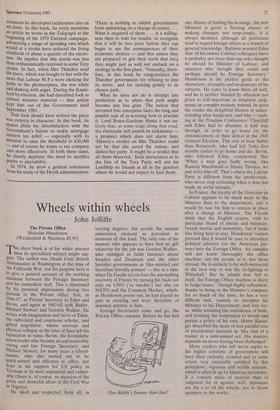Wheels within wheels
John Jolliffe
This short book is of far wider interest than its specialised subject might sug- gest. The author was (thank God) British Ambassador in Washington at the time of the Falklands War, but his purpose here is to give a general account of the working relations between the Foreign Secretary and his immediate staff. This is illustrated by his personal impressions during two Periods in the Private office: first, in 1944-47, as Private Secretary to Eden and Bevin, and again in 1963-65 with Butler, Michael Stewart and Gordon Walker. He writes with imagination and verve of Eden, the cultivated and courteous scholar, and gifted negotiator, whose nervous and physical collapse at the time of Suez left his reputation in ruins; Bevin, the formidable union leader who became an unforeseeably strong and fair Foreign Secretary; and Michael Stewart, for many years a school- master, who also turned out to be quick-witted and effective in office, not least in his support for US policy in Vietnam at its most unpopular and vulner- able (there is, of course, no mention of the grisly and shameful affair of the Civil War In Nigeria).
He liked and respected them all, in
varying degrees, but avoids the mutual admiration element so prevalent in memoirs of this kind. The only one of his masters who appears to have had no gift whatever for the job was Gordon Walker, who indulged in futile fantasies about Sweden and Denmark and the other Socialist governments as 'like-minded and therefore friendly powers' — this at a time when De Gaulle set on foot the astonishing recovery of France by turning his back not only on UNO ('ce machin') but also on NATO and the Common Market, which, as Henderson points out, he had played no part in creating and were therefore of minimal interest to him.
Foreign Secretaries come and go, the Private Office remains. Before he has had 'Our Rabbi's funnier than that!' any chance of finding his bearings, the new Minister is given a fleeting chance of making changes: not surpi !singly, it is always declined, although all politicians tend to regard foreign affairs as a branch of general knowledge. Baldwin warned Eden that 'of his twenty Cabinet colleagues there is probably not more than one who thought he should be Minister of Labour, and nineteen who thought they could and perhaps should be Foreign Secretary.' Henderson is the perfect guide to the characters, strengths and weaknesses of his subjects. He came to know them all well, and he is neither blinded by affection nor given to self-important or simplistic judg- ments on complex matters; instead, he gives the reader the delightful illusion of under- standing what happened, and why — start- ing at the Potsdam Conference: Churchill and Eden had to abandon it half way through, in order to go home for the announcement of their defeat in the 1945 General Election. This was at least better than Roosevelt, who had left Yalta five months earlier to go home and die. Bevin, Who followed Eden, commented that 'When a man goes badly wrong, like Ramsay Macdonald or Jimmy Thomas, we just write him off. That's where the Labour Party is different from the intellectuals, who never stop criticising when a man has made an awful mistake.'
In France, the loyalty of the Directeur de Cabinet appears to be much more to the Minister than to the department, and it would be rare for him to remain in place after a change of Minister. The French think that the English system, with its particular brand of checks and balances, breeds inertia and monotony, but it looks like being here to stay. Henderson 'cannot pretend that it would be easy to introduce political advisers (on the American pat- tern) into the Foreign Office. An outsider will not know thoroughly the office machine, not the people in it, nor those abroad. He is unlikely to be well-instructed in the best way to win the in-fighting in Whitehall.' But he admits that 'left to itself, the Foreign Office machine is likely to fudge issues.' Though highly influential, thanks to being in the Minister's company for so much of the time, he has a very difficult task, namely to interpret his Minister to his Department, and vice ver- sa, while retaining the confidence of both, and resisting the temptation to invent and pursue a policy of his own. Henry Kissin- ger described the more or less parallel role of presidential assistant as 'like that of a trainer in a wild-animal act. His mastery depends on never having been challenged.'
Many readers who will never aspire to the higher echelons of government will have their curiosity aroused and to some extent very enjoyably satisfied by this perceptive, vigorous and stylish account, which is often lit up by hilarious anecdotes. If it consists more of analysis than of judgment for or against, well, diplomats are the e to oil the wheels, not to throw spanners in the works.










































 Previous page
Previous page